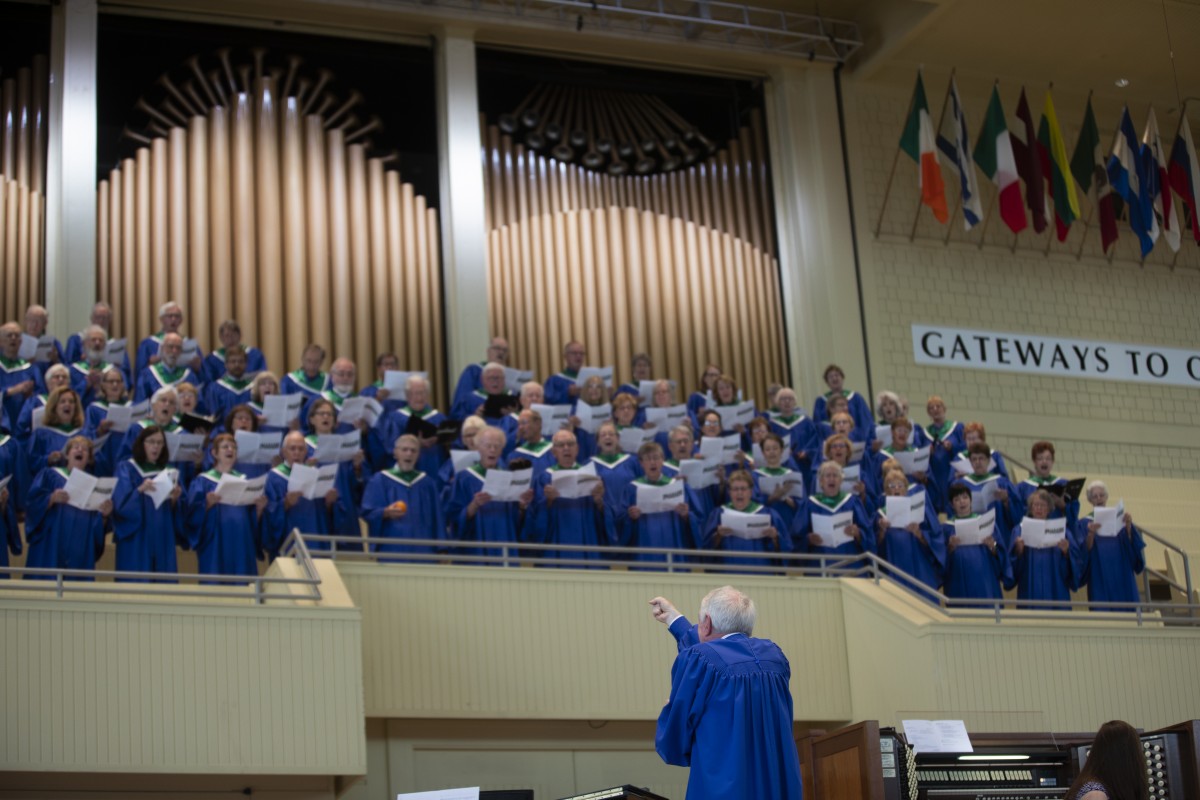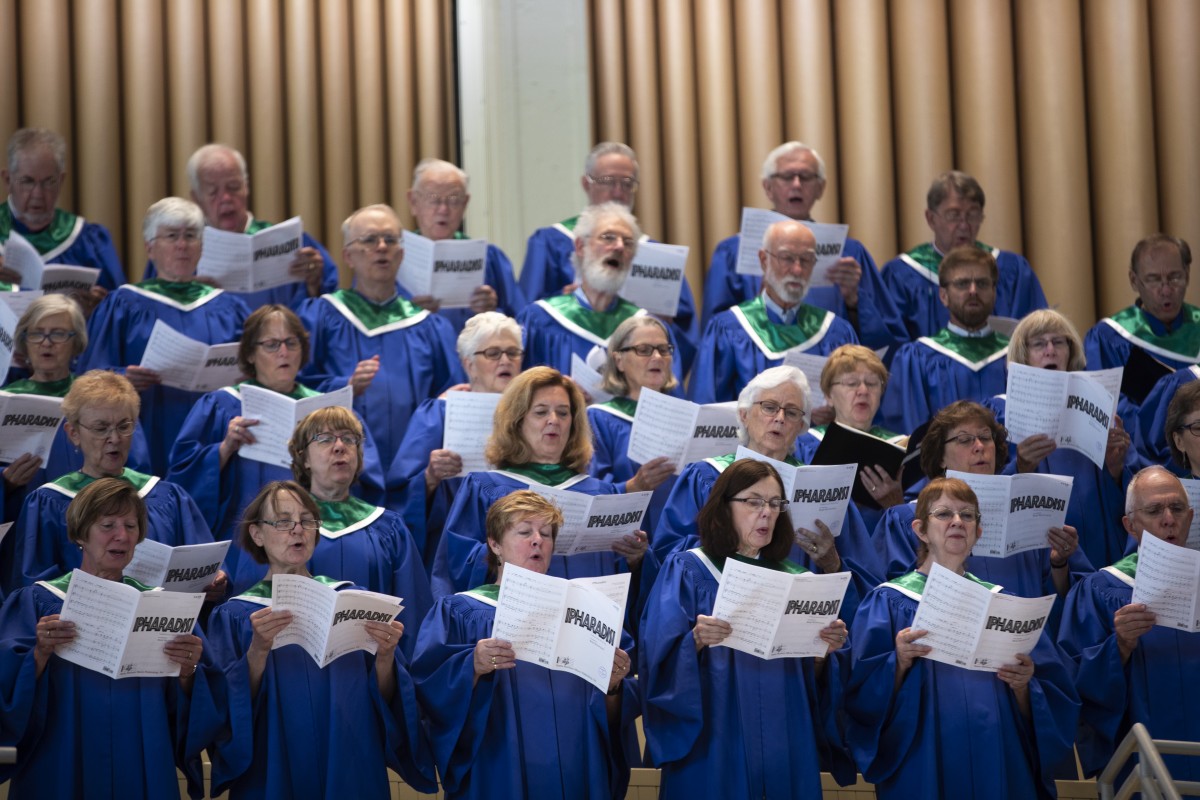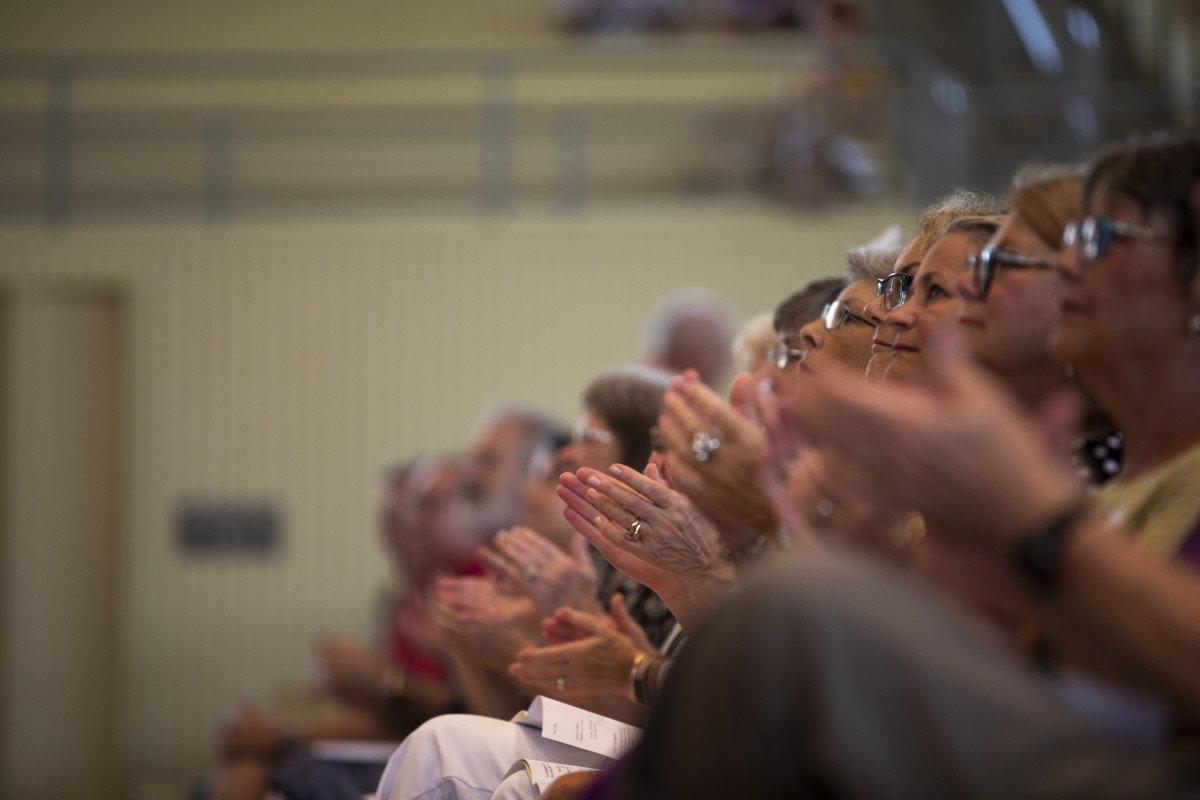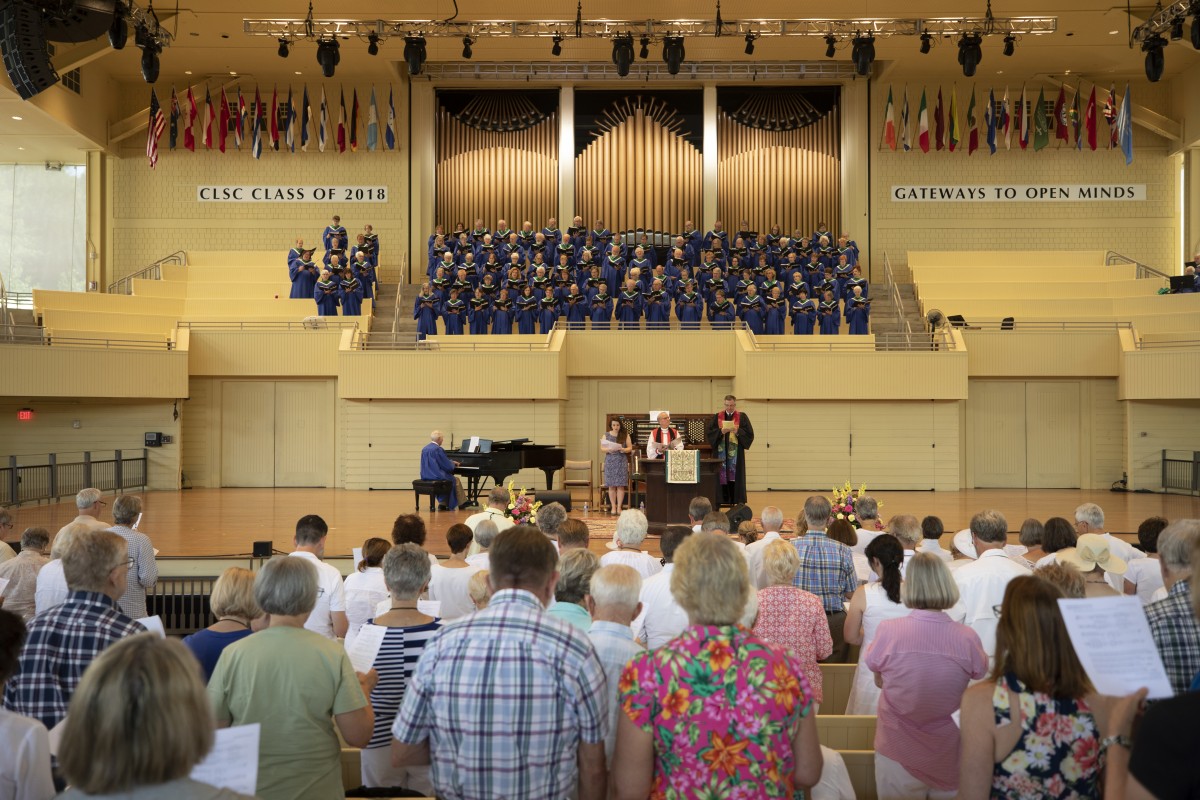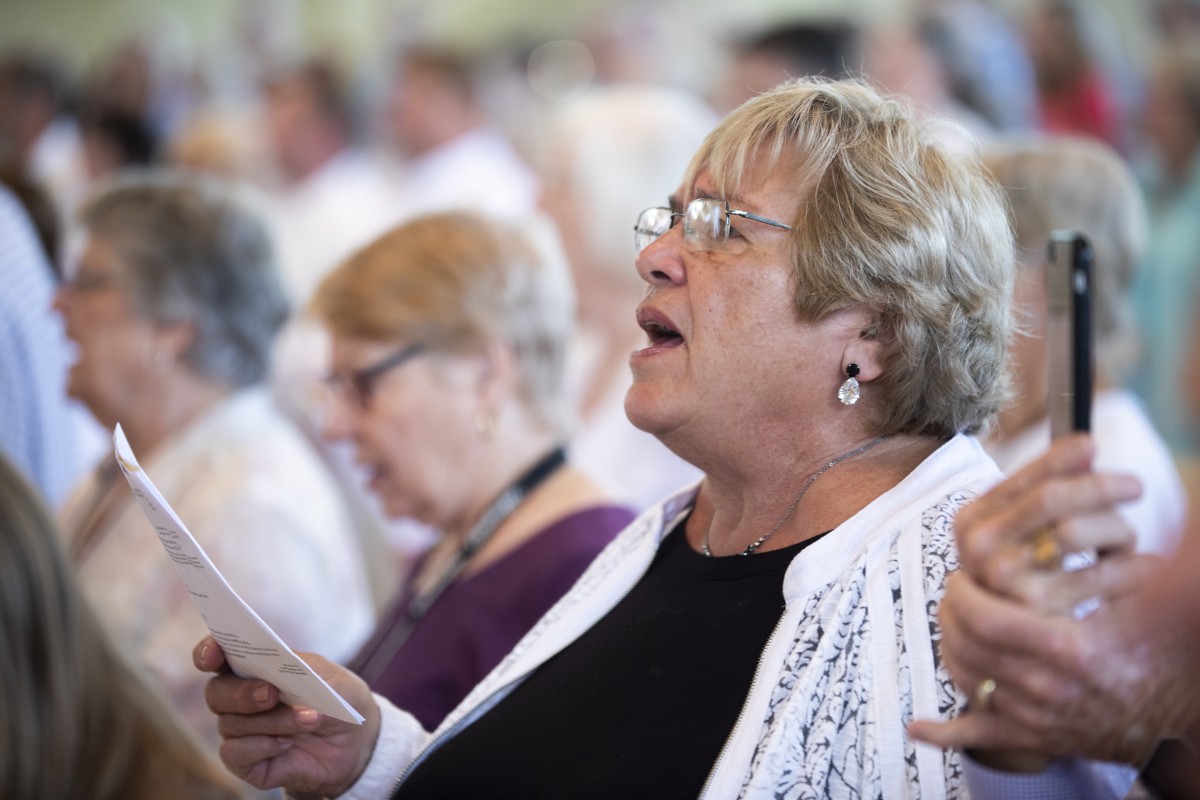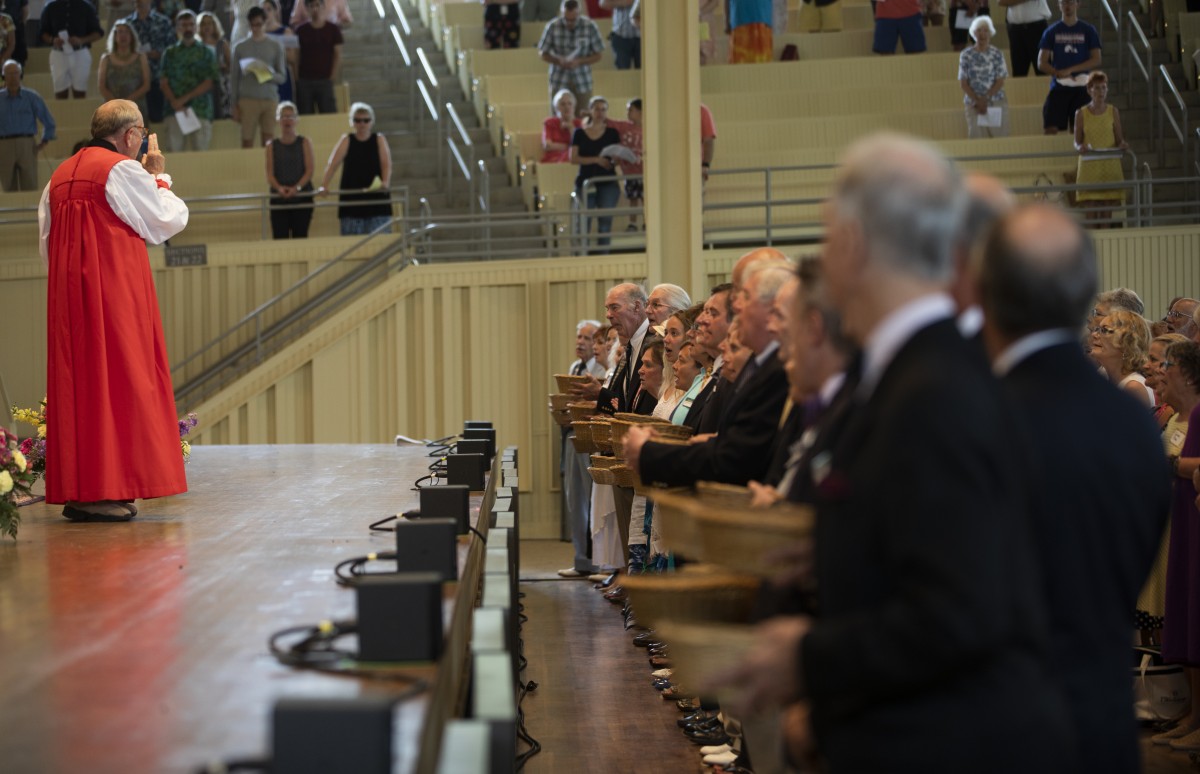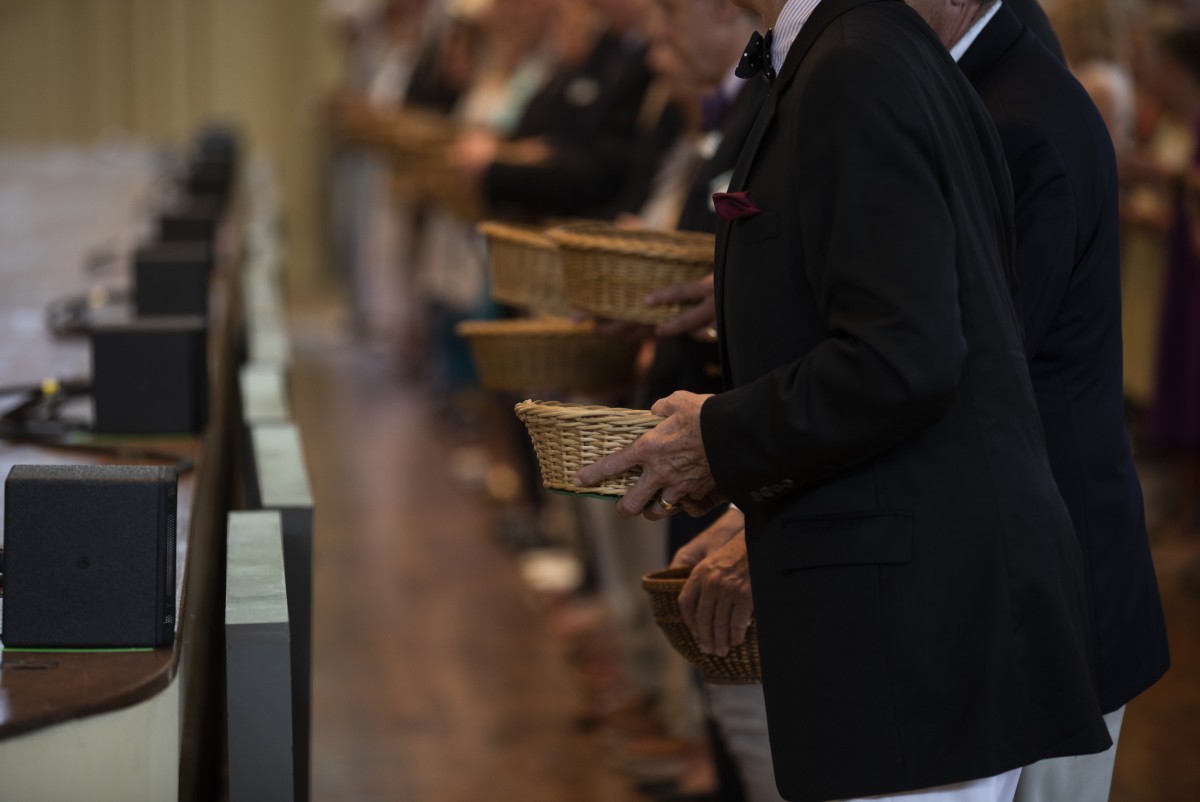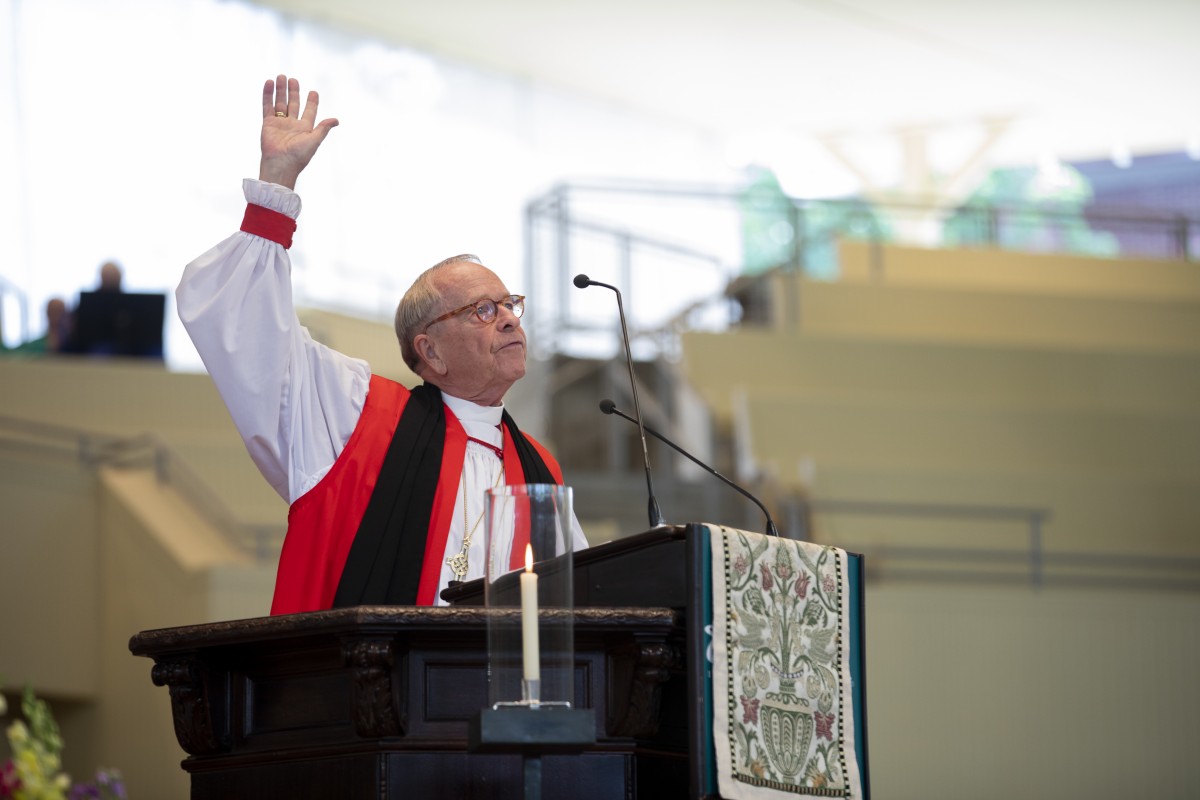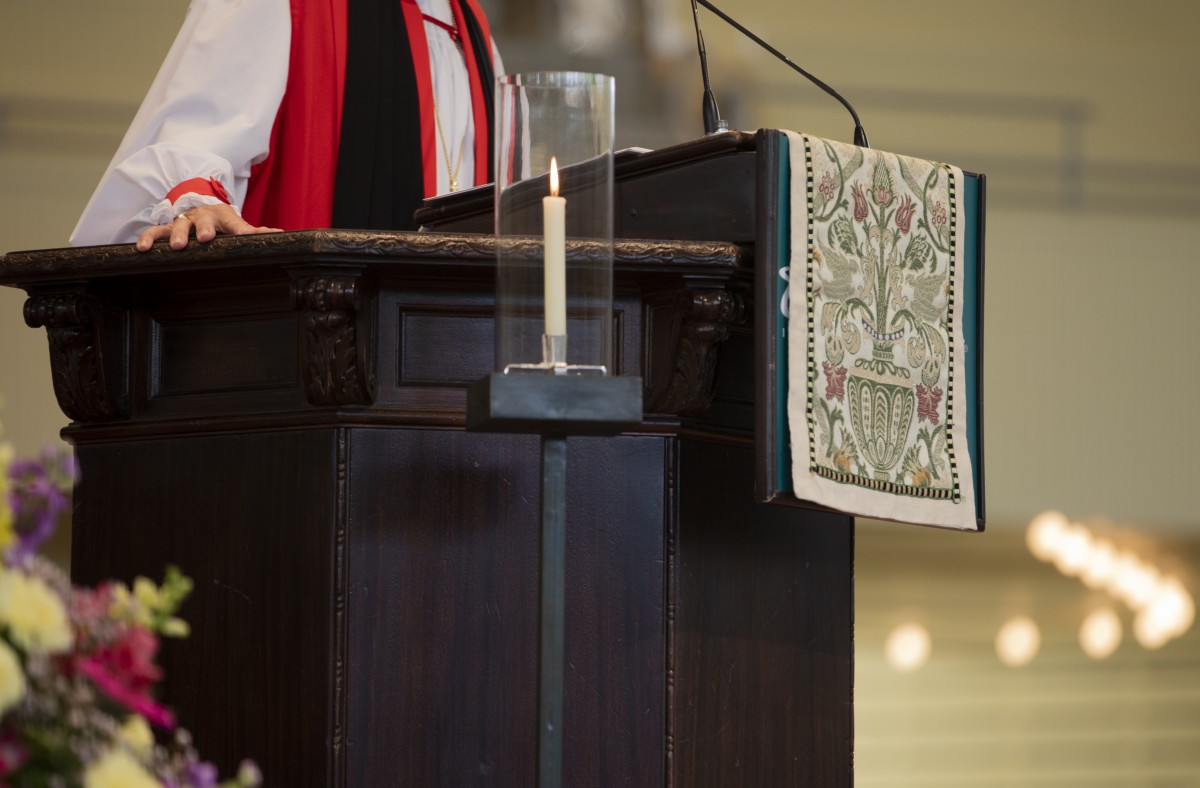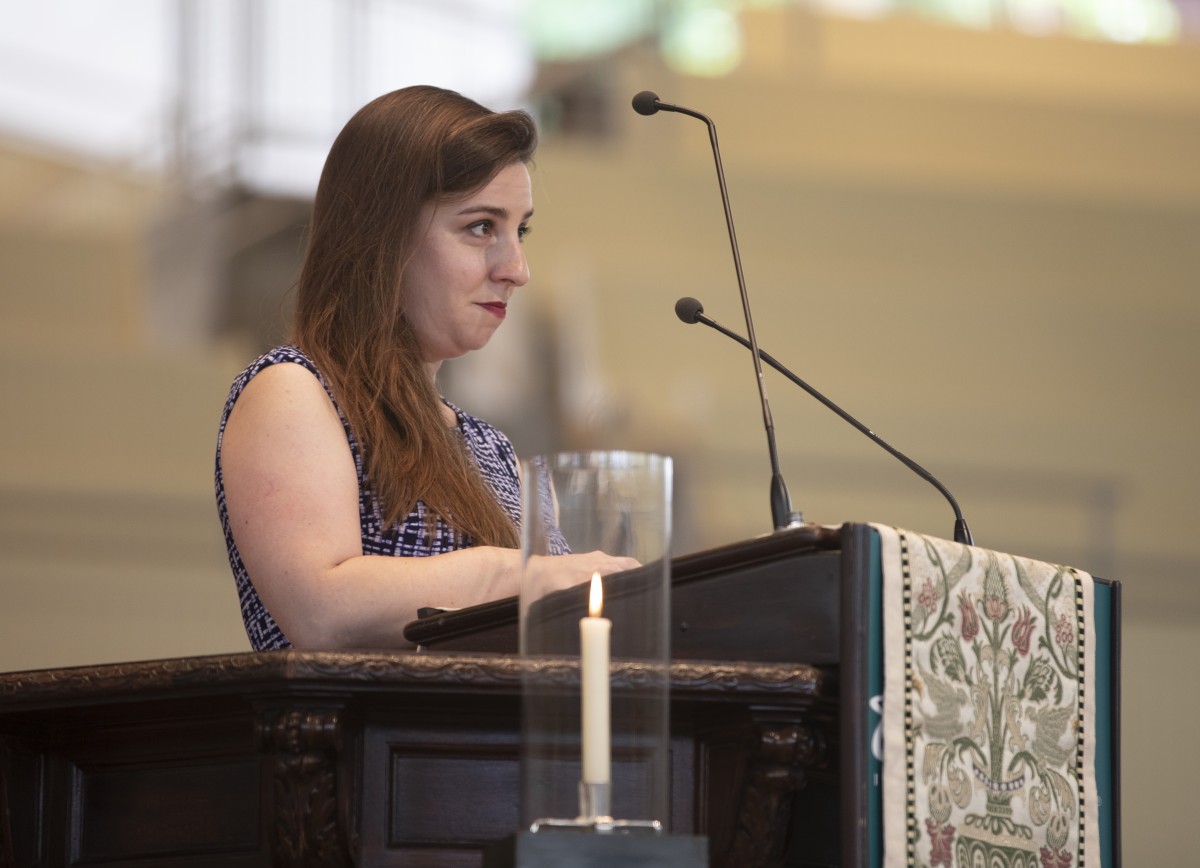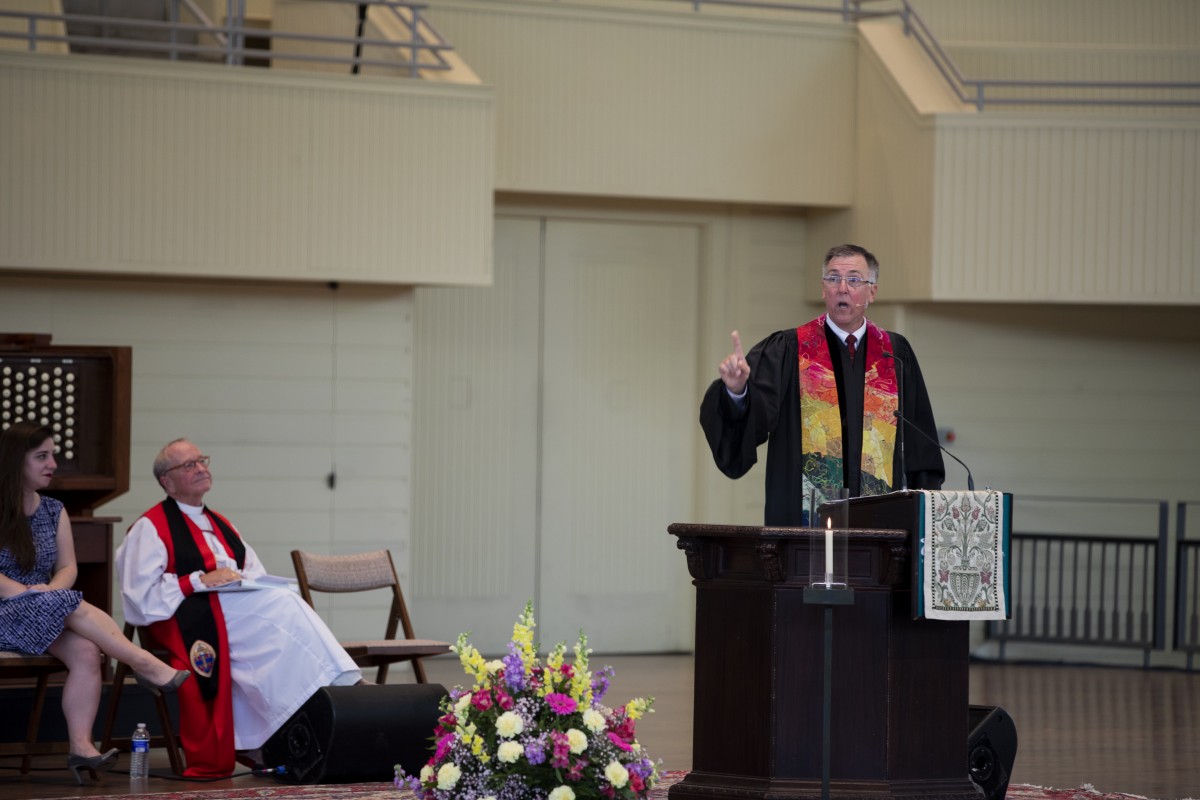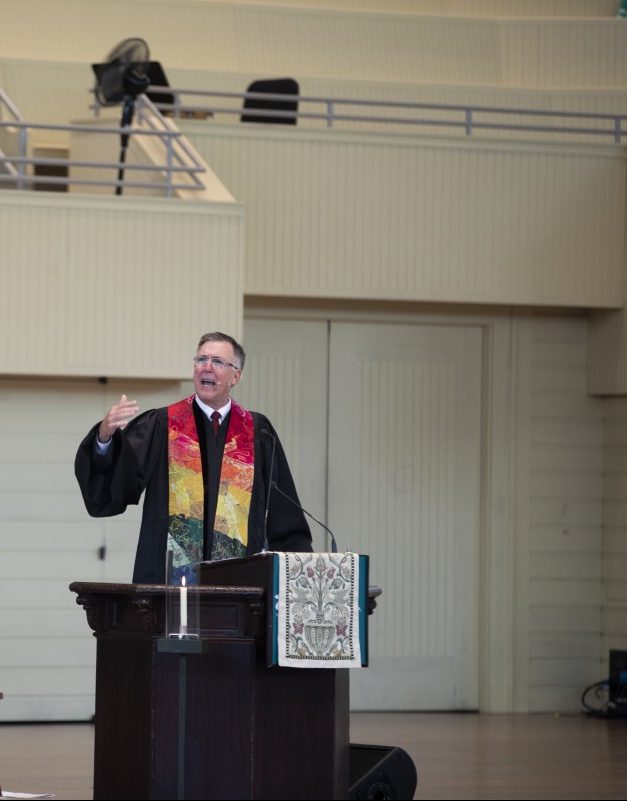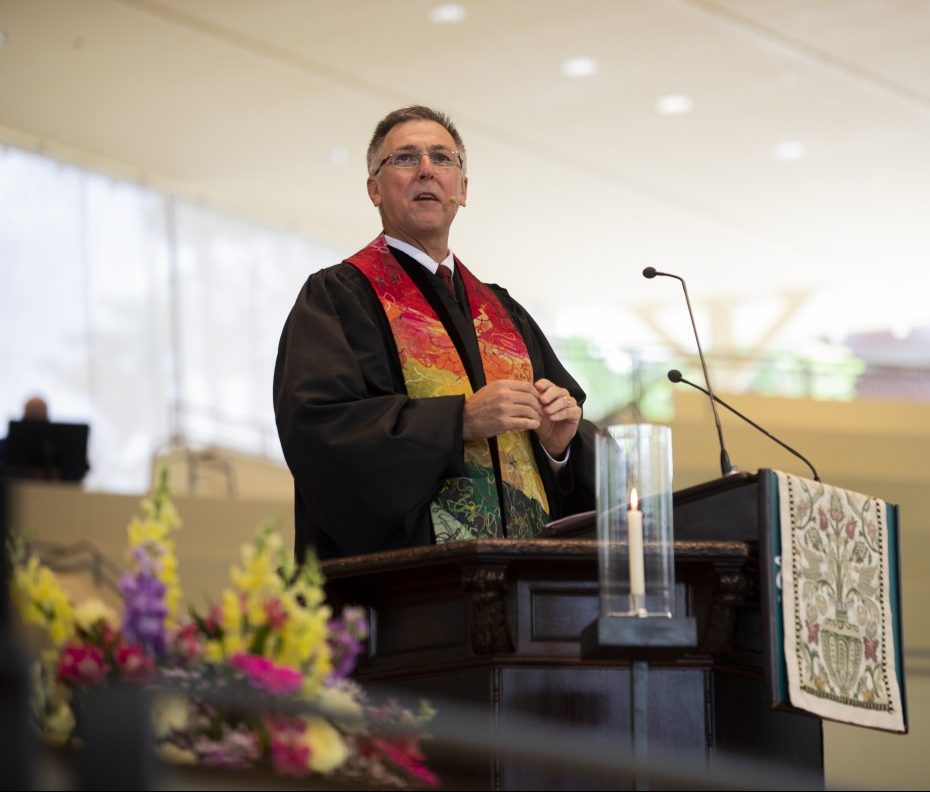“The arts are unnecessary,” said the Rev. David Shirey at the beginning of his sermon at the 10:45 a.m. Sunday, August 5, morning worship in the Amphitheater.
“The arts are just an add on,” he said, “a convenient line to cut in the school budget. We can do without the choir.”
“No,” the congregation said.
“We can do without band,” he said.
“No,” said the congregation.
“We can do without drama, painting, dance, right,” Shirey said. “Wrong, that is so, so wrong. Today, I want to put in God’s word for the arts in the context of Scripture.”
His sermon title was “The Handiwork of the Holy,” and the Scripture text was Exodus 35:4-9, 30-34.
In Exodus, God told Moses to build a tabernacle. The people of Israel were to make a freewill offering of gold, silver and bronze; purple, blue and crimson yarn; goat’s hair; olive oil for lights; acacia wood; onyx and precious stones.
“There is something about places of beauty that exude the beauty of holiness,” Shirey said.
We can worship anywhere, he told the congregation. He was once called to start a new church in Arizona that used an elementary school cafeteria.
“We worshipped there for 490 Sundays,” he said.
The milk machine made noises, and the lights were really bright, and the windows were standard-issue school cafeteria ones. The art was finger painting from the kindergarteners.
Beauty matters; the arts and beauty matter. We worship the Lord in the beauty of holiness.
“When I stepped into the 200-year-old sanctuary of Central Christian Church in Lexington, I knew I was not in a cafeteria any more,” Shirey said.
Psalm 84 begins, “how lovely is your dwelling place, O Lord of hosts!” The psalmist speaks of something that exudes holiness, Shirey said.
“I give thanks for people who make beauty,” he said. “As Sara (Toth) read so well, Scripture references artists.”
God had chosen Bezalel and filled him with the divine spirit, skill, intelligence and knowledge “in every kind of craft to devise artistic designs.”
Bezalel was to teach Oholiab all of these skills as well. They were to design beautiful things from the gifts of the people God requested.
“All the artists we know today who are gifted to build things of beauty, their forebears were Bezalel and Oholiab,” he said.
Shirey told the congregation to notice the verbs used in the Scripture. God chose Bezalel and appointed Oholiab and filled them with the spirit of God.
“How many of the great works of art show the Spirit of God?” he said.
The litany written by Jared Jacobsen for the Sunday worship service was a work of art, Shirey said.
“Theologian Henri Nouwen had a spiritual epiphany standing in front of Rembrandt’s painting ‘The Return of the Prodigal Son,’ ” Shirey said. “He was converted by a painter; painters preach by using brushes, not words.”
Shirey recalled poets of faith like T.S. Eliot, John Milton and Dante.
“Emily Dickinson said that the only commandment she had not broken was ‘consider the lilies,’ ” Shirey said.
He cited poet Mary Oliver, whose instructions were to pay attention, be astonished and tell about it. Poet Gerard Manley Hopkins said that the world was charged with the grandeur of God.
Bach, Shirey said, always put two initials at the top of a score, “J.J.,” which translated means “Jesus help me.” At the end of the score, Bach put S.D.G., soli deo gloria — to God only be the glory.
Shirey also recalled a concert at the Hollywood Bowl with 17,000 people listening to Yo-Yo Ma playing Bach cello suites for two hours and 40 minutes.
Turning to literature, Shirey noted that Fyodor Dostoevsky’s novels are filled with characters who are haunted by sin, but filled with grace.
“This is inspired art that tells us who we are and who God is,” Shirey said. “As essential as manna and water, so is the work of the hands of artists.”
Creativity is the connection between religion and art.
“God is creative. The cosmos is God’s canvas,” he said.
God divided the sea from the dry land and from clay made human beings, who are the handiwork of the holy.
Shirey said that we need an EQ — emotional quotient — the capacity to feel.
“I can’t think of anything we need more today,” he said. “The arts boost our EQ more than anything.”
The poet Stanley Kunitz said that art is a chalice into which transcendence is poured.
“The arts reflect something of God, believe something about God,” Shirey said. “Are they frivolous or foundational, expensive or a costly omission?”
He asked what if we change the first verse of Psalm 84 to be more utilitarian? It would read, “How economical is your dwelling place, O God.”
When Shirey’s daughter, Betsy, told her great-grandmother that she wanted to be an artist, her great-grandmother told her, “No, you don’t want to be an artist; there is no money in it.”
As Shirey decided that he wanted to spend his life working with words, he told his grandmother he wanted to be a preacher. She told him, “No, don’t do it; there is no money in it.”
Shirey recalled a father who wanted his son to become a lawyer. The son wanted to be an artist, and on Easter he was asked to compose new music for a concert. George Frideric Handel wrote “Messiah” and gave the proceeds of the concert to a debtor’s prison and a hospital.
“God called Bezalel and Oholiab to make something beautiful for God to dwell in, in the midst of his people,” Shirey said. “One hundred forty-four years ago, people put their gifts together to found Chautauqua.”
Here’s to the hard work of the holy, Shirey said.
“You go, artists!” He said. “Dance, dancers; paint, painters; sculpt, sculptors; play, Yo-Yo Ma. Artists bless us with the handiwork of the holy.”
The Rt. Rev. V. Gene Robinson, vice president of religion and senior pastor, presided. Sara Toth, editor of The Chautauquan Daily, lecture associate and communications coordinator, read the Scripture. This was the Chautauqua Literary and Scientific Circle’s Baccalaureate Service. Jared Jacobsen, organist and coordinator of worship and sacred music, directed the Chautauqua Choir. The choral introit was “Ipharadisi,” a traditional South African song arranged by Brad Richmond. Ipharadisi, “Paradise,” is a city dump in South Africa so named by its inhabitants “because it was where the ‘dead’ were living.” The responsorial psalm 150, “Praise Ye the Lord,” was by Judge Jefferson Cleveland, an important scholar and editor of African- American congregational song of the 20th century. The anthem was “As A Chalice Cast of Gold” by K. Lee Scott, words by Thomas Troeger, commissioned by the Chautauqua Choir in 2003 to honor Jacobsen’s appointment as its director. The offertory anthem was “Psalm 23” by Michael Hennagin. It was a gift from the Chautauqua Choir to the Institution’s library in tribute to Ross Mackenzie upon his retirement as director of the Department of Religion in 1999. The postlude was “Toccata in D” by Marcel Lanquetuit. The Gladys R. Brasted and Adair Brasted Gould Memorial Chaplaincy provides support for this week’s services.


